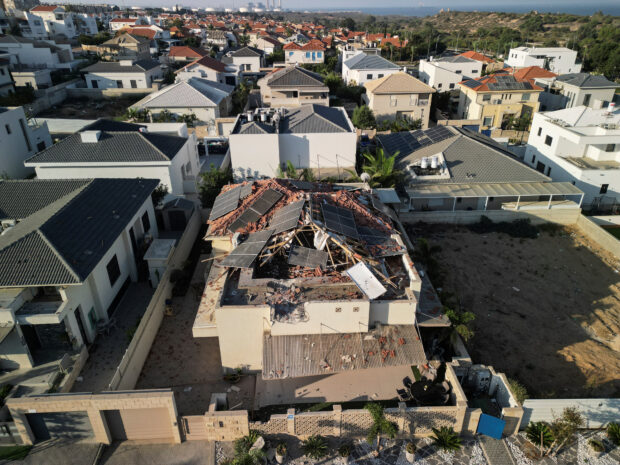
An aerial view shows the remains of a private house after it was hit by a rocket launched from the Gaza Strip into Israel, in Ashkelon, southern Israel October 15, 2023. REUTERS
GAZA — As Israel prepared on Sunday for a ground assault on the Hamas-controlled Gaza Strip, Palestinians who have lost numerous family members in air strikes were bracing for more destruction if Israel hits back on an unprecedented scale on its territory.
Um Mohammad Al-Laham sat next to her 4-year-old granddaughter Fulla Al-Laham, who lay in a Gaza hospital which like others is operating on low supplies of medicine and fuel.
She said an Israeli airstrike hit the family home, killing 14 people including Fulla’s parents, siblings and members of her extended family.
“All of a sudden and without warning, they bombed the house on top of the residents inside. No-one survived except my grandchild Fulla. May God cure her and give her strength,” said the grandmother, who has witnessed many wars between Hamas and the Israeli army over the years. She says this is the toughest.
“Fourteen people martyred, no-one was left except Fulla Saeed Al-Laham. She doesn’t talk, nothing, just lays in her bed and they give medicine.”
One other 4-year-old child in the family had also been left with almost no relatives, the grandmother said.
Israel has unleashed the heaviest air strikes ever on Gaza in retaliation for the biggest attack on the country one week ago by the Palestinian militant group Hamas since the 1973 Arab-Israeli war.
Israel has vowed to annihilate the militant group Hamas in retaliation for a rampage by its fighters in Israeli towns eight days ago in which its militants shot men, women and children and seized hostages in the worst attack on civilians in the country’s history.
Some 1,300 people were killed in the unexpected onslaught, which shook the country, with graphic mobile phone video footage and reports from medical and emergency services of atrocities in the overrun towns and kibbutzes.
Israel has responded with the most intense bombardment Gaza has ever seen, putting the small enclave, home to 2.3 million Palestinians, under siege and destroying much of its infrastructure.
Israel has told Palestinian to leave their homes and move south.
Hamas urged people not to leave, saying roads out were unsafe. It said dozens of people had been killed in strikes on cars and trucks carrying refugees on Friday, while medics, Hamas media and relatives say whole families have been killed in the air strikes. Reuters could not independently verify these claims.
Some residents said they would not leave, remembering the “Nakba,” or “catastrophe,” of 1948 when many Palestinians were forced from their homes during the war that accompanied Israel’s creation.
Israel has intensified its bombings across Gaza City and the north. Gaza authorities said more than 2,300 people have been killed, a quarter of them children, and nearly 10,000 wounded.
Rescue workers searched desperately for survivors of night-time air raids. One million people have reportedly left their homes.
The expected Israeli ground offensive combined with the air strikes themselves have raised fears of unprecedented suffering in the narrow, impoverished enclave.
Witnesses in Gaza City told Reuters the Israeli offensive had forced more people from their homes. Gaza’s largest Shifa hospital was overcrowded with people who had fled their houses.
“We are living the worst nightmare of our lives. Even here in the hospital we are not safe. An air strike hit in the area outside the hospital around dawn,” said a 35-year-old woman who declined to give her name.
Taking the road to southern Gaza, which is considered safer, has become more difficult as several people who had made the journey say Israel continues to bomb around it.
Ashraf Al-Qidra, spokesman of the Gaza health ministry, said 70% of the people in Gaza City and the north of the strip are deprived of health services after the Palestinian refugee agency UNRWA evacuated its headquarters and suspended its services.